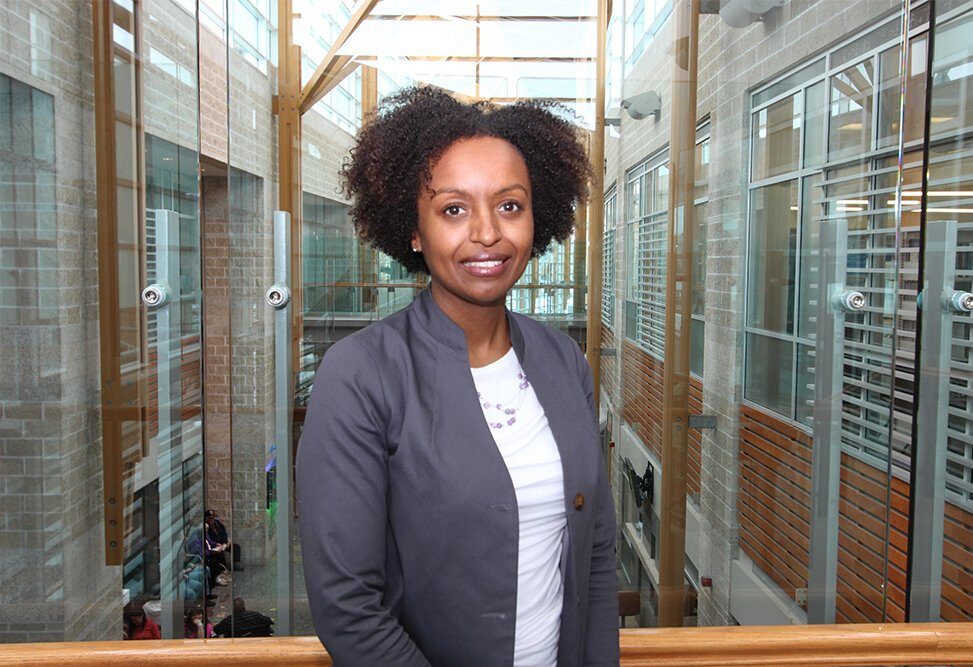A labour of love: Meet Dr. Naana Jumah, OB-GYN and advocate for Indigenous maternal health
Posted on February 15, 2024
Dr. Naana Jumah, an Obstetrician Gynaecologist at Thunder Bay Regional Health Sciences Centre and Assistant Professor at NOSM University, is an ally and advocate for Indigenous maternal health, and the recent winner of the Society of Obstetricians and Gynecologists of Canada’s Carl Nimrod Educator Award. A Rhodes Scholar, PhD in Engineering and Harvard-trained physician, Dr. Jumah has chosen to return home to practise in Thunder Bay, where she grew up after immigrating from Ghana as a child.
She’s quick to credit the many role models who have inspired her—starting with Moffat Makuto, organizer of the Regional Multicultural Youth Center in Thunder Bay.
“Being a newcomer to Canada, I was part of that youth group when I was a kid,” she recalls. “We travelled around the region and did programming for high school students throughout Northwestern Ontario and on reserves. As immigrant and refugee kids, we saw that the kids who had the hardest time adjusting to life in so-called ‘Canada’ were the kids coming from reserves. I saw that then, and it stuck with me. It was an area where I wanted to continue working and have a meaningful impact.”
Dr. Jumah first trained as an engineer, earning a PhD from the University of Oxford on a Rhodes Scholarship. “I loved engineering, but I really missed the kind of interactions I had when I was working with Moffat in the youth group, getting to know people and being part of their lives,” she says. “I applied to medicine hoping to do both.”
She didn’t initially intend to pursue obstetrics and gynecology. But, when a close family member passed away, Dr. Jumah had to rearrange her medical school clerkships. The result was a long clerkship in obstetrics, gynecology, and gynecological oncology, and she fell in love. “I realized that obstetrics and gynecology brought together all my interests. There was a combination of clinics and work in the operating room. There was an option for advocacy; the issues were important. The combination of skills was a really good fit,” she says.
Dr. Jumah has become a strong advocate and ally. She has supported numerous initiatives to help improve maternal health for Indigenous peoples, including working with Confederation College to train Indigenous women as lay maternal infant support workers, and creating a curriculum to train health-care workers in delivering culturally safe care that builds communications and trust with patients.
The work of which Dr. Jumah is proudest is supporting her colleague, Lisa Bishop, to develop an Indigenous midwifery program in Thunder Bay under an alternative funding model for Indigenous midwifery from the Ministry of Health. She supported the funding application for the program and helps in hospital if a patient needs care from an obstetrician.
“It’s been amazing to see the practice grow,” she says. “I’ve played a small part in trying to be an effective ally. I think it speaks to something tangible that we can do as health-care providers in trying to work towards reconciliation. It’s the right thing to do for patients, and it works towards the Truth and Reconciliation Commission’s calls to action—more Indigenous care providers, providing care in a culturally appropriate way.”
“Because of who I am, as a Black physician and immigrant, the challenges that patients face can be more obvious to me than they might be to physicians who have a different background,” she says.
For Dr. Jumah, Black History Month is a time to recognize the breadth of contributions from Black Canadians who have been here for generations, as well as immigrants from the Caribbean and Africa.
“Black History Month recognizes the importance of Black Canadians to the wider country. I think oftentimes the contributions are noticed in sports, arts, and entertainment. Outside of that, contributions are often overlooked, and that’s a stereotype of who Black people are. We’re good at sports, we’re good at music, but we’re not good at other things—like academic or technical accomplishments. Black History Month allows the spotlight to be shone on the community as a whole. That goes a long way into breaking those barriers and eliminating those stereotypes,” she says.


